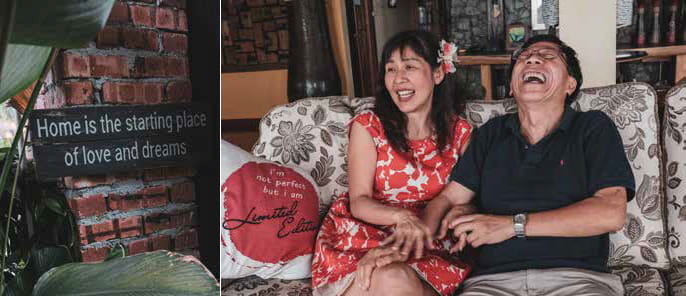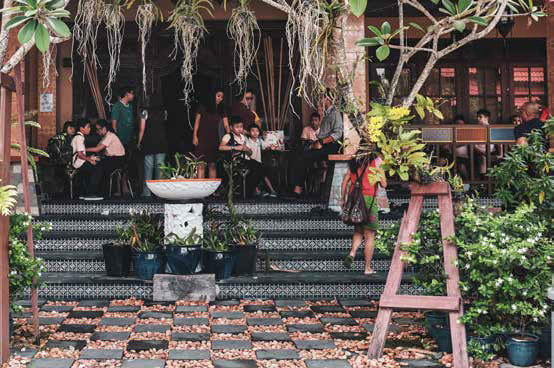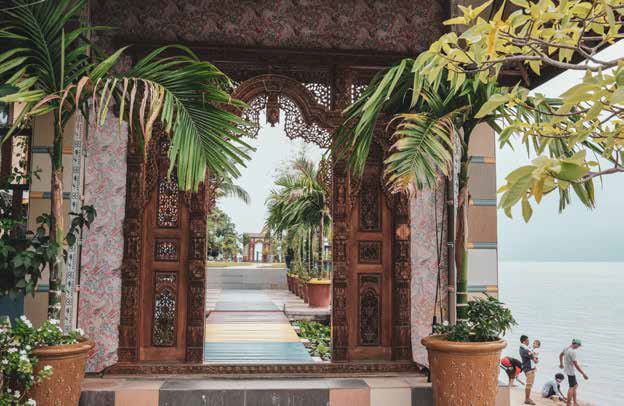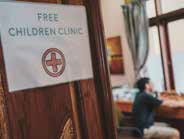Stories > Youth Haven
Youth Haven
A spirit of openness, resourcefulness and resilience helped the Chews turn their dream of building an inclusive school into a learning centre and resort that represents their motto in life – to educate and nurture.
BY Therese Tay
PHOTOS Tsen-Waye Tay
t is perhaps apt that Malaysian Dr Chew Yu Gee and his Singaporean wife, Melody Chew, call their lush Penang resort, Lost Paradise, the “reluctant hotel”.
Located by the sea in the popular tourist destination of Batu Ferringhi, the property also houses an inclusive school – the Lighthouse Academy – for children with learning and developmental challenges, in addition to those from underprivileged families.
“Neither the school nor the resort was on our mind when we moved into the compound over 12 years ago,” recalls Dr Chew, who has been living in Penang with his family for nearly three decades.
“Our family loved the sea and we wanted our kids to grow up here.” Motivated by a desire to make a difference in the lives of those with special needs and financially challenged, the couple converted a part of their home compound into Lighthouse Academy and a church in 2012.

from left: Lost Paradise houses a school, a hotel and a church; Dr Chew and his wife, Melody, have lived in the Batu Ferringhi location with their family for the past 12 years.
The move was partly sparked by their experience with their second son, Art, who was diagnosed with autism as a child. Despite only starting to talk at five years old, he was able to overcome his learning disabilities and is now a doctor.
According to Dr Chew, this was largely because the family could afford the resources – individualised care and education – to address his disorder.
“I think my son would not have become what he is if we didn’t provide him the support,” expresses Dr Chew.
“Parents need to have the hope that it is not the end to learn that your child has autism.”
Just two years into the school’s operations, however, Dr Chew encountered health issues and had to take a step back from his punishing work schedule at a government hospital as well as at Lighthouse Academy.
“Another source of income was needed to sustain the project. We, therefore, converted our home into a hotel in 2014,” he recounts.
With all five of their children already having moved out to forge their own careers, the couple started living above the school. “We love our house but we had to [share it],” recalls Dr Chew.
“It was noisy, and we didn’t have any privacy, but it was okay. The hotel took off.” And what an eclectic house – and hotel – it is.
AN INCLUSIVE WORLD
When visitors arrive at the resort, they often remark that it’s a psychedelic sensory overload. The buildings bear Minangkabau and Balinese influences in architecture and décor, with enthusiastic touches of batik, technicolour wallpaper, tiles and flowerpots.
This is further enhanced by Majapahitperiod wood furniture, intricately carved doors from Bali, collectors’ pieces from India and China, as well as art made from recycled materials. In addition to the worldly influences, Lost Paradise also offers a salubrious environment.
|
Dr Chew operates a free clinic at his home for the underprivileged. |
The rooms are spacious, and most have fantastic views. Large openings allow the sea breeze in, and visitors wake up to the sound of lapping waves. During the day, guests can spend leisurely afternoons lazing by the pool or enjoying a spa treatment. For thrill-seekers, there are water activities such as kayaking, windsurfing and sailing. One thing, however, the guests need to accept is the cacophony of chatter, squeals and laughter of children from the school. “We have had instances where hotel guests checked out immediately upon realising that they were sharing the compound with special needs children. They did not want to be reminded of the ‘pain’ in this world during their vacation,” Dr Chew explains. “We refunded their money.” |
The Chews use a curriculum that caters to each pupil’s individual learning needs. Each pupil receives more one-on-one attention compared to those in mainstream schools. While there is one teacher for every 15 students in classes that do not require extra attention, the ratio is one teacher for every three students in the case of special needs pupils. Ranging from pre-school to high school, students at Lighthouse Academy follow either the British or American pathways to attain an International Certificate of Christian Education Advanced Certificate or an American high school diploma respectively.

Lost Paradise is not just a beachside resort – it is also an inclusive school for special needs children, many of whom have gone on to pursue professional careers in different industries.
Since the school’s inception, some 20 students have graduated, and are now contributing in various sectors, including nursing, engineering, architecture and veterinary science. Aligned with their belief in inclusivity, the Chews try not to turn anyone away, even if they cannot afford to pay the school fees.
“While some children study for free, others only pay what they can, or their parents work at the resort as a form of barter trade,” says Dr Chew.

Located in the seaside town of Batu Ferringhi, Lost Paradise pays a nod to Balinese decor.
He also operates a free clinic in his home for patients who come from less fortunate backgrounds. These are often the children of fishermen of Batu Ferringhi and Telok Bahang, a suburb on Penang island.
“While Some Children Study For Free, Others Only Pay What They Can, Or Their Parents Work At The Resort As A Form Of Barter Trade.”
Dr Chew Yu Gee, Cofounder, Lost Paradise
HELPING HANDS
The couple are grateful for the help of family and friends, especially when the school was in its nascent stage.
“An education consultant, for instance, guided us in the establishment and administration of the school; a Swiss friend, who is experienced in special needs education, helped us train the younger teachers and organise the school; and teachers from another learning centre in Penang joined our pioneering team of young educators,” shares Dr Chew.
Their church members and friends also lent a helping hand by doubling up as housekeepers, receptionists, cooks and security guards. Over the years, guests, too, have contributed. He shares that a Dutch couple, who were long-term guests, grew so comfortable that they used the main kitchen to cook for staff, as well as help clean the pool and cut the grass.
Similarly, staff members see real meaning in their jobs, treating it as a “calling”. “Working at the Lighthouse Academy is a privilege and is life-changing,” says special education teacher Jerome Raj, who has been teaching at the school for over two years. “I remember an incident which really tested me, but also taught me the value of being patient. One of my students, who was diagnosed with developmental delay, could be rather rebellious. He did everything that was the opposite of given instructions.”
Perseverance seemed to be the key to address this challenge. Raj continued to engage the student until, one day, the latter presented him with a “make-believe Milo drink”.
The teacher describes it as the pupil’s way of “showing love and care”. The teacher-pupil relationship started improving.
He says: “I had invested time in entering his world, and building trust without being judgemental, which meant a lot to him.”
Over time, word has spread about the resort and school with travellers looking for a meaningful holiday experience. Since being featured on Our Better World, the digital storytelling platform by Singapore International Foundation, the story of Lost Paradise has been shared more than 1,000 times on social media, with ever more socially conscious readers enquiring about the property.
With these encouraging signs, Dr Chew is convinced that the legacy of Lighthouse Academy and Lost Paradise will continue.

